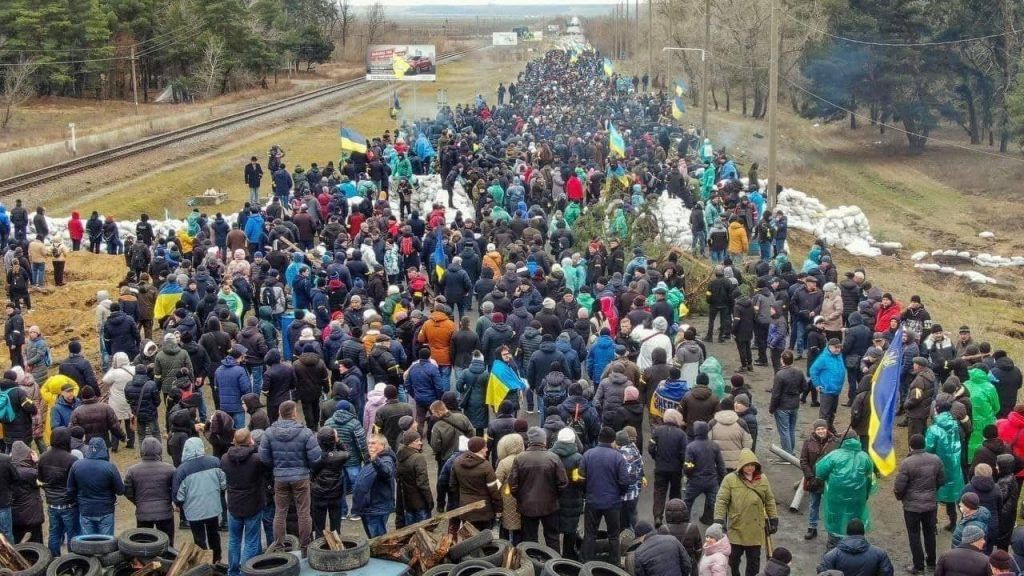Russian military surrounds Europe’s largest nuclear power plant as Ukrainians block access roads
By Jessica McKenzie | March 2, 2022
 Ukrainians block the access road to Zaporizhzhya Nuclear Power Plant, the largest in Europe. (Photo: Ministry of Internal Affairs of Ukraine)
Ukrainians block the access road to Zaporizhzhya Nuclear Power Plant, the largest in Europe. (Photo: Ministry of Internal Affairs of Ukraine)
Russian military forces have taken control of the territory around the Zaporizhzhia Nuclear Power Plant in Ukraine, which contains six of country’s 15 nuclear reactors, heightening concerns that the safety of the plant and its workers could be at risk.
“The situation in Ukraine is unprecedented and I continue to be gravely concerned,” the director general of the International Atomic Energy Agency (IAEA), Rafael Mariano Grossi, told the organization in an emergency meeting on Wednesday. “It is the first time a military conflict is happening amidst the facilities of a large, established nuclear power program.”
“The safety and security of nuclear facilities, and nuclear and other radioactive material, in Ukraine must under no circumstances be endangered,” Grossi told the organization’s board of governors. “I have called for restraint from all measures or actions that could jeopardize the security of nuclear and other radioactive material, and the safe operation of any nuclear facilities in Ukraine.”
Grossi also reminded the 173 member states of the IAEA, including Russia and Ukraine, that in 2009 they unanimously affirmed that “any armed attack on and threat against nuclear facilities devoted to peaceful purposes constitutes a violation of the principles of the United Nations Charter, international law and the Statute of the Agency.”
Russia informed the IAEA that it was in control of the region around Zaporizhzhia Nuclear Power Plant in a letter dated March 1. That same day, the State Nuclear Regulatory Inspectorate of Ukraine (SNRIU) asked IAEA to provide assistance in maintaining the safety and security of the Chernobyl disaster site, which was captured by Russian forces last week, and other nuclear facilities. As of Tuesday, the SNRIU said all nuclear power facilities remained under control.
Speaking to the press on Wednesday, Grossi clarified that Russia is in control of the area around the Zaporizhzhia Nuclear Power Plant and its general environs but has not taken control of the plant itself. “They have the physical control of the perimeter, including the village where most of the employees live,” he said.
Social media footage verified by CNN shows Ukrainian civilians and power plant workers blocking the access roads to the plant to prevent the Russian military from entering.
Residents and employees of the #Zaporizhzhia Nuclear Power Plant do not let the invaders pass into the city. People of #Ukraine are defending nuclear safety of Europe even with their bare hands #StandWithUkraine #StopRussianAggression #stopputin #stoprussia pic.twitter.com/2s7mN8cJmP
— Verkhovna Rada of Ukraine – Ukrainian Parliament (@ua_parliament) March 2, 2022
Nuclear power plants have not been designed to sustain the kind of damage that wars can inflict on people and infrastructure, Edwin Lyman, an expert on nuclear proliferation and nuclear terrorism, told the Bulletin. “In peacetime,” Lyman said, “the most severe threats are severe weather.”
The most significant risk is that damage from munitions could prevent the plant from maintaining cooling of the highly radioactive fuel in the core or of the spent fuel. This could also happen if the plant loses access to the grid and the back-up generators fail or the plant is otherwise unable to continue delivering power to the cooling system.
“That’s the situation they faced at Fukushima, in Japan, in 2011, where the plant lost both off-site and on-site power,” Lyman said. “In that case, there were very few means the operators had to try to keep the fuel from melting down, and the result was three core meltdowns. So it is critical that you keep cooling, however you can.”
Each nuclear reactor at Zaporizhzhia has three backup generators and seven days’ worth of diesel fuel to keep them running, Lyman said. In the wake of the Fukushima disaster, many nuclear power plant facilities around the globe, including in Ukraine, added measures to prevent disasters like Fukushima from happening. “Those measures could potentially be brought to bear in a crisis at one of Ukraine’s plants, but then that additional equipment is only as good as it’s protected,” Lyman added. “It’s only good if it’s available.”
The other risk at Ukraine’s nuclear facilities, active or not, is of human error. The people responsible for maintaining the safety and security of the facilities are working long hours under tense and dangerous conditions. Valentin Geiko, the head of the shift at Chernobyl, celebrated his 60th birthday on March 2, after working nonstop for six consecutive days to maintain the Russian-occupied plant. “He can’t hand over his shift and can’t leave his post,” SNRIU said.
“That’s the other issue is the plant personnel,” Lyman said. “If the enemy controls the plant and all the access points, are the personnel who were not on duty, are they going to report to work? And if not, then you have the shifts that are there now, they ordinarily will not have to work, nonstop, and can’t work nonstop.”
In theory, these facilities were designed by the Soviet Union, so Russia probably could bring in its own personnel to run them, but that just adds another wrinkle, Lyman said.
Grossi has called for nothing to prevent nuclear facilities workers from doing their jobs. “In this context, it is also imperative to ensure that the brave people who operate, regulate, inspect and assess the nuclear facilities in Ukraine can continue to do their indispensable jobs safely, unimpeded and without undue pressure,” he told his IAEA colleagues Wednesday. “I want to emphasize there is nothing normal about the circumstances under which the professionals at Ukraine’s four nuclear power plants are managing to keep the reactors that produce half of Ukraine’s electricity working.”
Together, we make the world safer.
The Bulletin elevates expert voices above the noise. But as an independent nonprofit organization, our operations depend on the support of readers like you. Help us continue to deliver quality journalism that holds leaders accountable. Your support of our work at any level is important. In return, we promise our coverage will be understandable, influential, vigilant, solution-oriented, and fair-minded. Together we can make a difference.
Keywords: Russia-Ukraine, Ukraine, Ukraine conflict, nuclear power plant, nuclear risk
Topics: Nuclear Energy, Nuclear Risk















Is Russia trying to safeguard the enriched uranium around the plants so Ukraine can’t make a bomb?
Depending on the location and the prevailing winds a Ukrainian version of the Samson Option could contaminate large portions of Russia. This is a last resort course of action but always a possibility.